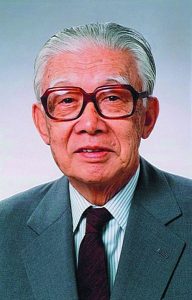Don’t work for the profits, work for innovation, this is what the Japanese researcher and the entrepreneur, Masaru Ibuka, had always followed. The co-founder of Sony Co. is one of the revolutionary figures of Japan’s electronics industry. The believer of hard work, Ibuka, is the biggest inspiration for not only the people of Japan but people from around the world. His dedication and hard work gave new means to the global electronics industry.
Early Life
Ibuka was born on 11 April 1908, in Nikko, Tochigi Prefecture, Japan. He was a studious kid at school and loved performing experiments in the labs. He completed his bachelor’s degree in electrical communications from the Waseda University, in 1933. During the college, he researched on experimental projection-type television system using a nitro-benzol Kerr cell and wrote his college thesis on the same.

After graduating from the college, Ibuka started working at the Photo-Chemical Laboratories Inc. He was employed as a researcher and was involved in the research work for the technology of sound recording on movie films. In 1937, he joined Nippon-Ko-On where he worked on the development of the home-based movie sound equipment. Later, in 1940 he left Nippon-Ko-On and joined the Japan Measuring Instrument Co., Ltd where he was involved in the research work on the mechano-electronic frequency-selective relays and telecommunication system. In the wake of World War II, he joined the department of Imperial Navy Wartime Research Committee.
Founding Sony
In 1945, Ibuka left his job in Navy and opened a radio repair shop at the Hirokiya Department Store in Nihonbashi, Tokyo. Later, with the capital of 190,000 Yen, he founded Tokyo-Tsushin Kenkyusho (Tokyo Telecommunications Laboratory) Co., following a merger into the Tokyo-Tsushin-Kogyo Co. In 1946, another Japanese researcher, Akio Morita, found out about Ibuka’s venture through the newspaper and was wanted to work with him. So he met Ibuka and the two co-founded Tokyo Telecommunications Engineering Corporation. Morita’s helped the two raise the funds for the company.
With the end of World War II and the big atom bomb attacks on Japan, the economy of Japan was devastated. Both the co-founders wanted to help in the economy of Japan and started their research work under the name of their newly founded company. In 1950, they were able to get a license to work on the transistor technology, becoming one of the first companies to use the transistor technology to non-military purposes. In the same year, the company launched Japan’s first tape recorder, the “G type.” In 1958, the company released another transistor radio, which was first of its kind. The company was soon providing its services to its international clients.
In 1958, the Tokyo Telecommunications Engineering Corporation was re-branded as Sony, after the co-founders realized that the Americans had trouble saying the name of the company. The next big invention of the company was the world’s first transistor television. In 1967, Sony Co. launched its first colour TV named Sony Trinitron.
Ibuka served the company as the president from 1950 to 1971, and then became the chairman of Sony from 1971, and retired in 1976.
Sony Co., released its first Walkman personal stereo in 1979, followed by a Handycam video camera in 1989, the famous PlayStation in 1994, and a Blu-ray Disc recorder in 2003. The company is a conglomerate and currently manufacture almost everything from a Smartphone to laptops, cameras to television, the electrical vehicle to home-based products. Sony Co. has built an international empire and has set its arms into the finance, entertainment and health sector as well.
According to the records, the company made a total revenue of 507.6 billion yen in the financial year 2017. In 2018, the company had 117,300 employees working in its different branches in different countries.
The company headquarter is located at Minato, Tokyo, Japan.
Personal Life
Ibuka was one of the prominent research engineers who brought innovation in the field of his interest. For his contributions in the rise of technology and the economy of Japan, he was awarded multiple awards. He even received the three doctorate degrees from three different institutions, i.e. from the Sophia University (1976), Tokyo, Waseda University, Tokyo (1979) and Brown University, US (1994). He also received the IEEE Founders Medal in 1972 from IEEE and the highest distinction of the Scout Association of Japan, the Golden Pheasant Award, in 1989.
Ibuka also wrote a book named ‘Kindergarten is Too Late’ in 1971. According to the book, the leaning for humans begins at the age of 3. On 19 December 1997, he died at the age of 89 in Tokyo, Japan.

Yashica is a Software Engineer turned Content Writer, who loves to write on social causes and expertise in writing technical stuff. She loves to watch movies and explore new places. She believes that you need to live once before you die. So experimenting with her life and career choices, she is trying to live her life to the fullest.